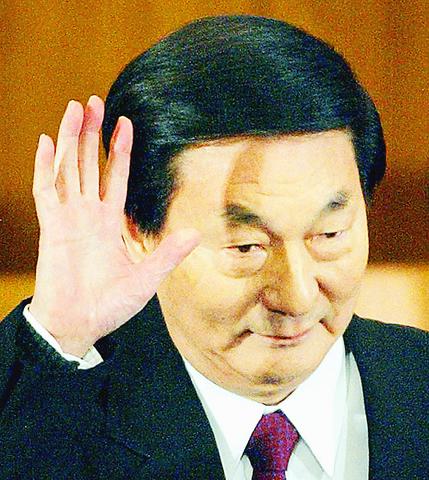In a speech to China's legislature yesterday, Chinese Premier Zhu Rongji (朱鎔基) referred to China and Taiwan as "two countries," but he quickly backed up and referred to Taiwan and China as "two sides."
"We should further expand the scope of personnel visits between the two countries," Zhu said in a swan-song speech to the last session of China's parliament before he retires.
He swiftly corrected himself to say "between the two sides of the Strait".

PHOTO: APN
Zhu's slip of the tongue reminds people of the political row between Taiwan and China in 1999, when then president Lee Teng-hui (李登輝) described cross-strait links as state-to-state relations. China angrily cut off all official dialogue in retaliation for Lee's remark.
Last year, China also lashed out at President Chen Shui-bian's (
Only three years ago, China's premier scowled and wagged his finger as he warned Taiwanese voters that electing an independence-minded president could mean war with China.
But on the eve of his retirement, Zhu yesterday voiced a different message about Taiwan -- an appeal void of threats and filled with soft language that urged the two sides to unify peacefully.
Zhu's remarks came in a lengthy report that opened the annual meeting of the National People's Congress. His speech appeared to be part a new strategy to abandon the old threats and use kind words to lure Taiwan back to what China says is its motherland.
"We must implement the basic principles of peaceful reunification," the premier said in an address heavy with the jargon of China-Taiwan relations.
He said China would "strive for an early resumption of dialogue and negotiation between the two sides."
Beijing would also further expand economic and cultural exchanges as well as promote restoring direct shipping and aviation links, Zhu said.
"We should increase our exchange of views with all political parties and prominent people of various circles in Taiwan," he said.
Zhu did not repeat Beijing's longstanding threat to attack Taiwan if it seeks formal independence or drags its feet too long on unification.
"The strategy is working in the international arena because China is giving the world the impression that it's being reasonable with Taiwan," said Cho Hui-wan, an assistant professor of international politics at National Chung Hsing University in Taichung.
"China is also winning points with some people living in Taiwan," Cho added.
Cho doubts any friendlier approach will bring substantial improvement in relations. Zhu still emphasized that both sides must agree on the "one China" principle.
"Even though China's tone has become softer and more relaxed," Cho said, "they haven't relaxed their principles."
Taiwan said Zhu's speech yesterday didn't show any change in China's policy toward Taiwan, but noted relations between the two were improving.
"Zhu Rongji's speech reiterates communist China's persistent political stance, but we see a continuation of an improving atmosphere from his report," an official at the Mainland Affairs Council said.
"Both sides want to maintain peaceful interaction," said the official, Jan Jyh-horng (

A preclearance service to facilitate entry for people traveling to select airports in Japan would be available from Thursday next week to Feb. 25 at Taiwan Taoyuan International Airport, Taoyuan International Airport Corp (TIAC) said on Tuesday. The service was first made available to Taiwanese travelers throughout the winter vacation of 2024 and during the Lunar New Year holiday. In addition to flights to the Japanese cities of Hakodate, Asahikawa, Akita, Sendai, Niigata, Okayama, Takamatsu, Kumamoto and Kagoshima, the service would be available to travelers to Kobe and Oita. The service can be accessed by passengers of 15 flight routes operated by

MORE FALL: An investigation into one of Xi’s key cronies, part of a broader ‘anti-corruption’ drive, indicates that he might have a deep distrust in the military, an expert said China’s latest military purge underscores systemic risks in its shift from collective leadership to sole rule under Chinese President Xi Jinping (習近平), and could disrupt its chain of command and military capabilities, a national security official said yesterday. If decisionmaking within the Chinese Communist Party has become “irrational” under one-man rule, the Taiwan Strait and the regional situation must be approached with extreme caution, given unforeseen risks, they added. The anonymous official made the remarks as China’s Central Military Commission Vice Chairman Zhang Youxia (張又俠) and Joint Staff Department Chief of Staff Liu Zhenli (劉振立) were reportedly being investigated for suspected “serious

ENHANCING EFFICIENCY: The apron can accommodate 16 airplanes overnight at Taoyuan airport while work on the third runway continues, the transport minister said A new temporary overnight parking apron at Taiwan Taoyuan International Airport is to start operating on Friday next week to boost operational efficiency while the third runway is being constructed, the Ministry of Transportation and Communications said yesterday. The apron — one of the crucial projects in the construction of the third runway — can accommodate 16 aircraft overnight at the nation’s largest international airport, Minister of Transportation and Communications Chen Shih-kai (陳世凱) told reporters while inspecting the new facility yesterday morning. Aside from providing the airport operator with greater flexibility in aircraft parking during the third runway construction,

American climber Alex Honnold is to attempt a free climb of Taipei 101 today at 9am, with traffic closures around the skyscraper. To accommodate the climb attempt and filming, the Taipei Department of Transportation said traffic controls would be enforced around the Taipei 101 area. If weather conditions delay the climb, the restrictions would be pushed back to tomorrow. Traffic controls would be in place today from 7am to 11am around the Taipei 101 area, the department said. Songzhi Road would be fully closed in both directions between Songlian Road and Xinyi Road Sec 5, it said, adding that bidirectional traffic controls would